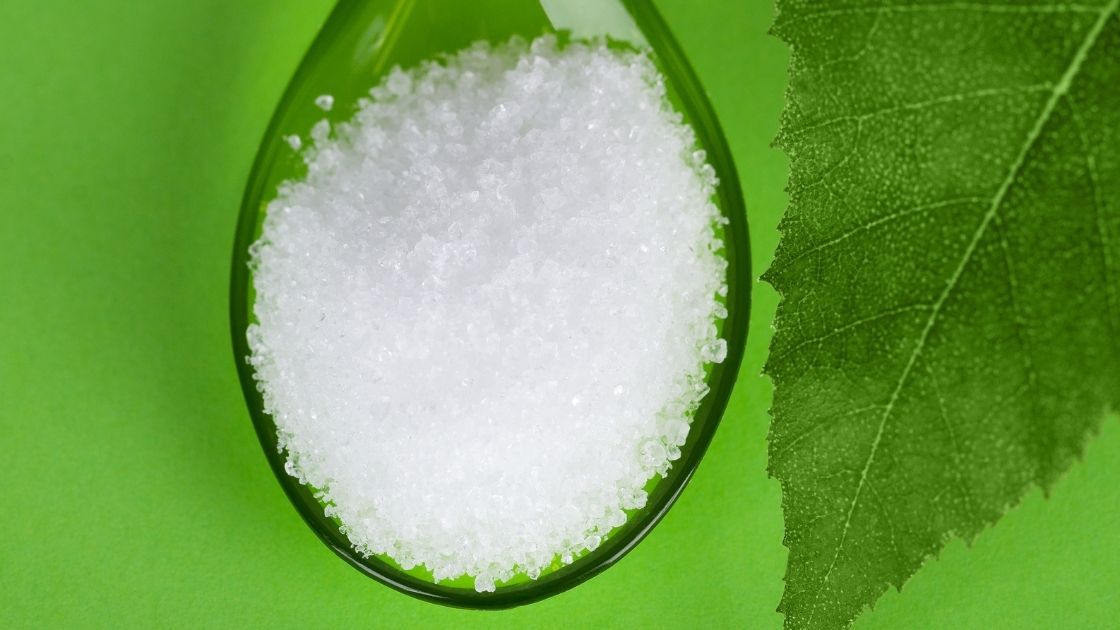A solution of xylitol, a natural sugar-like substance, was found to be better than standard salt solution as a nasal irrigating solution for patients with repeated bouts of nose and sinus infections or chronic rhinosinusitis. This was revealed by Dr. Lin Lin and his team of researchers in their clinical trial published in the American Journal of Otolaryngology Head and Neck Medicine and Surgery in 2017.
Dr. Lin found that patients treated for 30 days with xylitol had significantly better outcomes and symptom control than those treated with standard salt solution. Xylitol, once considered only for sugar-free candies, could now be considered as a means to effectively irrigate the sinunasal cavities and manage nasal infections.1
What is Xylitol?
Xylitol is a naturally-occurring sugar-like compound. It got its name from the Ancient Greek xylon meaning wood since it was first extracted from beech trees.2
Although xylitol has a similar degree of sweetness to table sugar, it is low on calories and even proven to be protective against dental cavities. Xylitol is poorly metabolized by the body – roughly 60% of the calorie yield of table sugar, hence its appeal as a low-calorie sweetener for weight management. These benefits have made xylitol a widely used sugar substitute.3
Xylitol Supports the Salt-sensitive Immune Defense of the Nose
Clues to the potential benefits of xylitol for the nose emerged with the broader understanding of how the nose typically protects itself from infections. The cells of the nose were found to be capable of naturally producing antimicrobial compounds like lysozymes and lactoferrins that act to kill the infection-causing germs trapped in the mucus layering the nose.
However, it was discovered that these natural antimicrobial compounds are sensitive to the levels of salts in mucus. The higher the salt content of mucus, the lower the activity of these antimicrobial compounds becomes, making the body susceptible to infections. It was also found that the problem of highly salted mucus is more pronounced in cases associated with thickened mucus that results from irritation and inflammation of the nasal passages. In addressing these concerns, the potential of xylitol was recognized by researchers.
As determined in 2000 by researchers from the University of Iowa and the Washington University led by Dr. Joseph Zabner, xylitol has some properties that allow it to decrease the salt concentration of mucus and enhance the natural antimicrobial defense of the nasal lining. One, xylitol can act as an osmolyte, an agent that can hold water in a solution, which in effect will prevent the mucus from becoming too thick and concentrated with salt. Xylitol is also absorbed by the body for several hours allowing it to maintain the water in mucus for a longer period of time. Two, xylitol maintains the bacterial killing action of the antimicrobial compounds found in nasal secretions in contrast to salt. This was further supported by the finding that bacterial counts in the noses of healthy volunteers were significantly lowered by xylitol sprays compared to salt solution. Three, xylitol, although similar to sugar, will not support bacterial growth because it is poorly utilized by bacteria.4
Xylitol May Also Make Bacteria Less Resistant
Some infection-causing bacteria are able to avoid harm by forming biofilms. Biofilms are a collection of bacteria clumped together in their own secretion of a slimy and sticky organic material. A common example of biofilm is dental plaque. Inside biofilms, bacteria are protected from harmful environmental factors such as dehydration, chemicals, the body’s immune system and even antibiotics. Biofilm formation is a major issue in bacterial resistance particularly for repeated nasal and sinus infections. Fortunately, Xylitol has also been identified as one of the compounds that has potential in managing bacterial biofilms. Dr. Ravi Jain and his team of researchers from the University of Auckland in 2016 showed that Xylitol effectively works against biofilms by inhibiting its formation and by disrupting the established biofilms of the usual bacteria implicated for chronic rhinosinusitis.5
Is Xylitol Safe?
The safety of xylitol can be attested by its long history of being used as a sugar substitute even in children’s chewing gum. The US FDA classifies xylitol as GRAS (Generally Recognized as Safe). Even at high dosages of 45 g per day in children or 100 g per day in adults, the primary concern is only diarrhea. Clinical trials using xylitol in irrigating solutions found it well tolerated among patients without dangerous effects.6
While xylitol started out as a sweet substitute for the calorie-conscious, it is now emerging as a viable option in the management of nasal infections. Our increasing understanding of the different factors that determine the ability of our nose to combat infections has allowed us to explore for unique solutions and in this case, the solution may be actually be sweet in the form of xylitol.
References:
Lin L, Tang X, Wei J, Dai F, Sun G. Xylitol Nasal Irrigation in the Treatment of Chronic Rhinosinusitis. Am J Otolaryngol.
Zacharis C. Sweeteners and Sugar Alternatives in Food Technology. 2nd ed. John Wiley & Sons;
Salli K, Lehtinen MJ, Tiihonen K, Ouwehand AC. Xylitol’s Health Benefits Beyond Dental Health: A Comprehensive Review. Nutrients.
Zabner J, Seiler MP, Launspach JL, et al. The Osmolyte Xylitol Reduces the Salt Concentration of Airway Surface Liquid and May Enhance Bacterial Killing. Proc Natl Acad Sci U S A.
Jain R, Lee T, Hardcastle T, Biswas K, Radcliff F, Douglas R. The in Vitro Effect of Xylitol on Chronic Rhinosinusitis Biofilms. Rhinology.
National Center for Biotechnology Information. PubChem Database. Xylitol, CID=6912.

